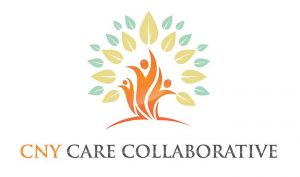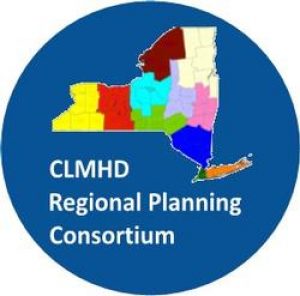

An enhanced training program, funded by the Central New York Care Collaborative (CNYCC) and developed by Falk College’s School of Social Work in partnership with the CNY Regional Planning Consortium (RPC), and other state and local stakeholders, will benefit frontline workers who play a critical role in the state’s efforts to integrate patient care services. Proposed by the CNY RPC in late 2018 and launched in January 2020, the Care Coordination Certificate Program (CCCP) will help workers operate effectively in an increasingly complex service landscape. It is anticipated to have positive statewide and national implications for Medicaid reform.
“The Regional Planning Consortium is where regional collaboration, problem-solving, and systematic improvements for the integration of mental health, addiction treatment services, and physical healthcare occur as it relates to Medicaid Reform,” says Katie Molanare, CNY RPC coordinator and statewide lead for the RPC Workforce Committee.
The RPC is a network of 11 regional boards across New York State, comprised of stakeholders who work closely to guide behavioral health policy in the region, problem solve service delivery challenges, and recommend priorities to the State for reinvestment of Medicaid savings. Workforce development has been a focus area for the CNY RPC since 2018 when the idea for specialized training for care management staff was discussed with CNYCC and Syracuse University. The training was approved by the committees and board in 2019.
Combining data collected from the CNY RPC Workforce Development Committee, other regional care management training pilots, and aspects of the Falk College’s School of Social Work framework, the ten-week training for frontline workers includes topics on Medicaid redesign, strengths-based practice, ethics and boundaries, engagement, and documentation. It will also involve workers’ direct supervisors, who will play a crucial role in helping staff connect the skills they acquire in the CCCP to their daily practices.
“Our collective aim was to make the program sustainable and bring it to scale. As frontline workers develop new competencies, it will be important for their supervisors to understand what they are learning to help them connect their coursework to real-world practice,” says Matthew Spitzmueller, assistant professor and principal investigator of the CCCP. Co-investigators from the School of Social Work include Nancy Mudrick, professor, and Tracy Walker, director of field placement.
The 30 frontline care workers and 10 supervisors participating in the pilot program represent organizations integral to the certificate’s development. They include Children’s Consortium, Circare, Liberty Resources, The Neighborhood Center, Oswego County Opportunities and Oswego Health. All six organizations currently sit on an advisory board for the project, including the CNY RPC, which provided the advisory board with relevant regional data collected from frontline staff and supervisors.
“Improving health and wellness is essential to delivering the best possible care for patients across the community”, says Cathy Homkey, executive director at the Central New York Care Collaborative. “By investing in this type of training for frontline care workers, they will gain the skills and expertise needed to improve care and connect services in a way that is in the best interest of the patient. Offering these types of tools can increase employee satisfaction and lead to a more positive work environment which plays a key role in staff retention.”
A 2014 Medicaid waiver awarded to New York State from the Centers for Medicare and Medicaid Services targeted a 25 percent reduction in avoidable hospitalization over a five-year period. Its triple aim targets improving population health, enhancing the quality of care, and reducing the per capita cost of health care. The waiver addresses critical issues across the state and allows for comprehensive reform through a Delivery System Reform Incentive Payment (DSRIP) program. The DSRIP program promotes community-level collaborations and focuses on system reform.
CNYCC is the lead entity for the DSRIP program in Central New York. Through the New York State DSRIP Program, CNYCC supports service integration, collaboration on patient care, quality improvement, and the shift toward value-based payment. CNYCC’s goal is to empower its partner organizations and their employees with the necessary skills to deliver integrated care management services and provide resources for effective care management principles.
“A workforce responsible for care coordination must be equipped with proper training. A certificate program that targets the complex responsibilities of this workforce will mitigate unanticipated impacts on human service organizations. Syracuse University’s School of Social Work is uniquely well-positioned to develop a certificate program that addresses the full spectrum of opportunities and challenges facing the care coordination workforce,” says Diane Lyden Murphy, dean, Falk College.
Care coordination involves a diverse workforce made up of practitioners who collectively treat the whole person, from primary care providers, mental health and substance use disorder providers, case managers and home healthcare managers to employment specialists, housing providers, residential and respite care workers, among others who often practice independently of each other. While better integration of these services benefits individuals and families receiving them, implementation has produced a number of challenges for frontline workers and the organizations that employ them.
“Behavioral health frontline staff face many challenges with the work that they do. In addition to having no clear job guidelines, frontline staff have an average of 40+ clients with high needs, they must complete multiple assessments within a tight timeframe, and they must understand community resources and government services. This puts an enormous amount of stress on this workforce, especially for those coming into the field with no prior experience,” adds Molanare. “The unique and essential role that frontline staff play is crucial to Medicaid Reform succeeding and paving the way for these high-need clients to receive the care they deserve.”
Essential to these efforts is the role of managed care organizations administering primary and behavioral health services, promoting accountability and quality improvement. While these reforms create new opportunities for cross-sector collaboration and innovation, they also produce unanticipated challenges in the workforce that is charged with executing the State’s goal of integrating care across systems that were traditionally siloed.
“For more than 60 years, Syracuse University’s School of Social Work has trained thousands of bachelor- and master-level social workers who today are direct care providers and program administrators across the systems
that contribute to population health. The School is eager to partner with nonprofit organizations, advocates, and public officials to develop, implement, and evaluate a pilot certificate program that addresses a critical need in the care coordination workforce,” adds Spitzmueller, whose research examines direct service provision to adults with severe and persistent mental illness, the strategies behavioral health workers adopt as they negotiate changing work conditions under Medicaid reform, and the impact of policy reform on socially and economically vulnerable people.
Central New York Care Collaborative is a partnership that connects more than 2,000 healthcare and community-based service providers in six counties across Central New York–Cayuga, Lewis, Madison, Oneida, Onondaga, and Oswego. The primary goal of the collaborative is to serve the population by improving the coordination of healthcare services, enhancing the quality of performance outcomes, and creating an overall better system of care for patients. More information can be found at cnycares.org.
